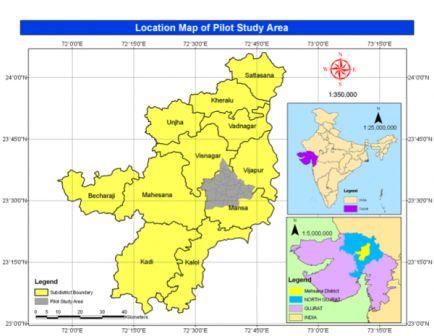/topics/irrigation
Irrigation
Defect in water rate amendment notification issued on 01/10/2010 by Orissa Government
Posted on 08 Feb, 2011 03:40 PMIrrigation tanks and their traditional local management - A remarakable ancient history of India - Paper presented at the National Seminar on Water and Culture (2007)
Posted on 31 Jan, 2011 03:20 AMTanks are rainwater harvesting techniques which capture water during monsoons for later use. Mention of tanks in colonial texts is made and the authors infer from ancient texts like Tamil Purananuru on the importance of tanks and the locations for their construction, as well detailing their geographical spread.
Glimpses of Bhagiratha Vidya - Irrigation engineering in ancient India - Paper presented at the National Seminar on Water and Culture (2007)
Posted on 31 Jan, 2011 01:33 AMThere is mention of the importance of water in daily life in various prayers in the Rigveda. The author states that the earliest evidence of water conservation goes back to 3000 B. C. when Gabarbands were built in Baluchisthan. The Harappans built tanks and wells and were pioneers of well-digging technology.
Decline of tank irrigation institutions in South India - A case-study of Tamil Nadu - Paper presented at the National Seminar on Water and Culture (2007)
Posted on 30 Jan, 2011 03:34 AMThe author gives a brief history of tank irrigation in South India. The number of irrigation tanks in India were 208,000, of which 120,000 were in the three Southern states of Andhra Pradesh, Karnataka and Tamil Nadu. These tanks irrigated 1.8 million hectares. The author uses graphs to point out to the decline in tank irrigation.
Regenerating natural resources and rural livelihoods in rainfed areas of India: A civil society consultation by WASSAN to discuss priorities for the twelfth five year plan
Posted on 26 Jan, 2011 09:13 PM A civil society consultation was held on “Regenerating natural resources and rural livelihoods in rainfed areas of India” by WASSAN at Hyderabad in December 2010 to discuss priorities for the twelfth five year plan. The Planning Commission, Government of India has been steering the process of development in India by conceptualizing five year plans and had sought inputs from civil society organizations, activists groups, networks of CBOs / NGOs, donors and others for preparing an approach paper for twelfth plan.
A civil society consultation was held on “Regenerating natural resources and rural livelihoods in rainfed areas of India” by WASSAN at Hyderabad in December 2010 to discuss priorities for the twelfth five year plan. The Planning Commission, Government of India has been steering the process of development in India by conceptualizing five year plans and had sought inputs from civil society organizations, activists groups, networks of CBOs / NGOs, donors and others for preparing an approach paper for twelfth plan.
The objective of the consultation workshop was to contribute to the process of defining broad contours of twelfth plan with a focus on rural livelihoods the thrust area being policy framework, funding support, institutional arrangements etc., by -
- Consolidating the lessons from good practices in promoting and protecting rural livelihoods in the country, that could be integrated in twelfth five year plan.
- Systematically articulating issues and concerns (bottlenecks) in promoting and protecting rural livelihoods, which could be addressed in the twelfth five year plan.
R&D Programme of Ministry of Water Resources (MoWR)
Posted on 24 Jan, 2011 03:32 PMMinistry of Water Resources (MoWR) provides financial assistance to promote research work in the field of Water Resources Engineering. The assistance is provided by way of grants to academicians/experts in the Universities, IITs, recognised R&D laboratories, Water Resources / Irrigation departments of the Central and State Governments and NGOs. Research proposals of applied nature as well as basic research are considered for MoWR support.
Considering wide range of topics covered by Water Resources Engineers, five committees called Indian National Committees (INCs) have been constituted to co-ordinate the R&D programme. The five INCs are:
INC for Hydraulics Research (INCH)
- Management of Floods
- Hydraulic Structures (including masonry and concrete structures)
Performance audit of Accelerated Irrigation Benefit Programme (AIBP) by CAG (2010)
Posted on 23 Jan, 2011 07:29 PMThe audit was conducted as a follow up audit of the earlier report on AIBP (No 15 of 2004) to assess whether the performance of AIBP had improved, and also whether the key issues highlighted in the earlier report had been appropriately addressed.
Geo-hydrological studies for augmentation of spring discharge in the Western Himalaya – Final technical report by the MOWR
Posted on 23 Jan, 2011 04:39 PMIt is an attempt to understand the effect of rainfall, physiography, lithology, slope and aspect, land use practices, vegetation, altitude, soil type and anthropogenic interference (e.g., road construction and settlement etc.) and other characteristics in the spring recharge zone on the water yield and water quality of the selected springs in the mid-altitudinal belt (lesser Himalaya) in western Himalaya (Uttaranchal).
The worsening water crisis in Gujarat - The Earth Institute
Posted on 20 Jan, 2011 04:41 PMIt was the kick-off event of an ambitious project to find solutions to the groundwater crisis in Gujarat, funded by the PepsiCo Foundation. More details of the project will follow this overview post.
 Gujarat and the Mehsana region, India Source: Columbia Water Center
Gujarat and the Mehsana region, India Source: Columbia Water Center
Managing Natural Resources -A report by IDSAsr
Posted on 18 Jan, 2011 04:24 PMThe scarcity value of natural resources has risen due to rising pressure of human population and demands made by modern economics progress. As such managing these resources has become very important.




